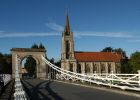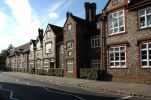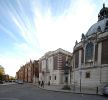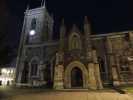Discover the...
Marlow Community Choir at Borlase
Josef Haydn - Missa Brevis Sancti Joannis de Deo: Small Organ Mass
Small Organ MassThe Missa brevis Sancti Joannis de Deo in B-flat major by Joseph Haydn was written in 1775 for the Barmherzige Brüder in Kismarton, Hungarian Kingdom, (now Eisenstadt, Austria) whose patron saint was St. John of God. Sometimes known as the "Kleine Orgelmesse" ("Small Organ Mass") because of the extensive organ solo in the Benedictus.
Originally scored for choir, strings and organ, there also exist versions with trumpets and timpani, and clarinets.
The setting is divided into six movements:
- Kyrie Adagio, common time, B-flat major
- Gloria Allegro molto, 3/4, B-flat major (originally Joseph's was just 31 measures, Michael's is 118)
- Credo Allegro, common time, B-flat major - "Et incarnatus est..." Adagio 3/4 - "Et resurrexit..." Allegro
- Sanctus Allegro, 6/8, B-flat major
- Benedictus Moderato, common time, E-flat major - "Osanna..." 6/8, B-flat major
- Agnus Dei Adagio, 3/4, B-flat major
The setting of the Crucifixus is longer than in Haydn's previous Missa Brevis (the one in F).
Being a missa brevis, several clauses of the text are set simultaneously in different voices. This Mass was also used in Salzburg, where the textual compression was deemed "unacceptable" so Michael Haydn (Joseph's brother) expanded the Gloria. Very few performances however, use Michael's expansion. In the latter, the Gloria lasts less than a minute. However, the Oxford edition presents Michael's prolongation in the main body of the text and Joseph's short original as an appendix. Johann Georg Albrechtsberger wrote an alternate Benedictus.
Ralph Vaughan - 'Five Spiritual Songs'
Five Mystical SOngs The Five Mystical Songs are a composition by Ralph Vaughan Williams, written between 1906 and 1911. The work sets four poems (Easter divided into two parts) by George Herbert, from his 1633 collection The Temple: Sacred Poems. While Herbert was a priest, Vaughan Williams himself was an agnostic, though this did not prevent his setting of verse of an overtly religious inspiration. The work received its first performance on 14 September 1911, at the Three Choirs Festival in Worcester, with Vaughan Williams conducting.The work is written for a baritone soloist, with several choices for accompaniment:
- Piano only
- Piano and string quintet
- TTBB chorus, a cappella
- Orchestra with optional SATB chorus. This was the choice used at the premiere
Like Herbert's simple verse, the songs are fairly direct, but have the same intrinsic spirituality as the original text. They were supposed to be performed together, as a single work, but the styles of each vary quite significantly. The first four songs are quite personal meditations in which the soloist takes a key role, particularly in the third Love Bade Me Welcome, where the chorus has a wholly supporting role (quietly and wordlessly singing the plainsong melody O Sacrum Convivium), and the fourth The Call, in which the chorus does not feature at all. The final Antiphon is probably the most different of all: a triumphant hymn of praise sung either by the chorus alone or by the soloist alone; unlike the previous songs, a separate version is provided for a solo baritone. It is also sometimes performed on its own, as a church anthem for choir and organ: Let all the world in every corner sing.
1. Easter - from Herbert's Easter
Rise heart; thy Lord is risen.
Sing his praise without delayes,
Who takes thee by the hand,
that thou likewise with him may'st rise;
That, as his death calcined thee to dust,
His life may make thee gold, and much more, just.
Awake, my lute, and struggle for thy part with all thy art.
The crosse taught all wood to resound his name, who bore the same.
His stretched sinews taught all strings, what key
Is the best to celebrate this most high day.
Consort both heart and lute, and twist a song pleasant and long;
Or since all musick is but three parts vied and multiplied.
O let thy blessed Spirit bear a part,
And make up our defects with his sweet art.
2. I Got Me Flowers - from the second half of Easter
I got me flowers to strew thy way;
I got me boughs off many a tree:
But thou wast up by break of day,
And brought'st thy sweets along with thee.
The Sunne arising in the East.
Though he give light, and th'East perfume;
If they should offer to contest
With thy arising, they presume.
Can there be any day but this,
Though many sunnes to shine endeavour?
We count three hundred, but we misse:
There is but one, and that one ever.
3. Love Bade Me Welcome - from Love (III)
Love bade me welcome: yet my soul drew back.
Guiltie of dust and sinne.
But quick-ey'd Love, observing me grow slack
From my first entrance in,
Drew nearer to me, sweetly questioning
If I lack'd anything.
A guest, I answer'd, worthy to be here:
Love said, You shall be he.
I the unkinde, ungrateful? Ah, my deare,
I cannot look on thee.
Love took my hand, and smiling did reply,
Who made the eyes but I?
Truth Lord, but I have marr'd them: let my shame
Go where it doth deserve.
And know you not, sayes Love, who bore the blame?
My deare, then I will serve.
You must sit down, sayes Love, and taste my meat:
So I did sit and eat.
4. The Call - from The Call
Come, my Way, my Truth, my Life:
Such a Way, as gives us breath:
Such a Truth, as ends all strife:
Such a Life, as killeth death.
Come, my Light, my Feast, my Strength:
Such a Light, as shows a feast:
Such a Feast, as mends in length:
Such a Strength, as makes his guest.
Come, my Joy, my Love, my Heart:
Such a Joy, as none can move:
Such a Love, as none can part:
Such a Heart, as joyes in love.
5. Antiphon - from Antiphon (I)
Let all the world in ev'ry corner sing:
My God and King.
The heavens are not too high,
His praise may thither flie;
The earth is not too low,
His praises there may grow.
Let all the world in ev'ry corner sing:
My God and King.
The Church with psalms must shout,
No doore can keep them out;
But above all, the heart
Must bear the longest part.
Let all the world in ev'ry corner sing:
My God and King.
Eric Whitacre - The Seal Lullaby (text by Rudyard Kipling)
The Seal LullabyOh! Hush thee, my baby, the night is behind us,
And black are the waters that sparkled so green.
The moon, o'er the combers, looks downward to find us,
At rest in the hollows that rustle between.
Where billow meets billow, then soft be thy pillow,
Oh weary wee flipperling, curl at thy ease!
The storm shall not wake thee, nor shark overtake thee,
Asleep in the arms of the slow swinging seas!
Hashi Venu - Israeli Folk Song
Hashi VenuHashi veni, Hashi venu
Adonai, elecha
Vena Shuva, vena shiva
Chadesh, chadesh ya menu Kekedom
Return us, oh Lord, to you and we will return
Return us, oh Lord, to you and we will return
Renew all our days of old and we will return
Renew all our days of old and we will return
Haydn Wood - Roses of Picardy (Lyrics by Fred Weatherby)
The lyricist Fred Weatherly had become impressed with beauty of the voice of the soprano Elsie Griffin, who later became a leading artiste with the D'Oyly Carte Opera Company. Her singing of his compositions resulted in his writing two of the most popular hits of the 20th-century "Danny Boy" (1910) and "Roses of Picardy". The composer Haydn Wood wrote the music for over 200 ballads, of which "Roses of Picardy" became his most popular. Wood related that, as he was going home one night on the top of a London bus, the melody came to him. He jumped off the bus and wrote down the refrain on an old envelope while standing under a street lamp.The exact story that lies behind the words of the song is unclear, but in his 1926 memoirs, Weatherly suggested that it concerned a love affair of one of his close friends. Weatherly travelled in France visiting the Rhone valley and Chamonix. Picardy was a historical province of France which stretched from north of Noyon to Calais via the whole of the Somme department and the north of the Aisne department. This area contained the Somme battlefields – the scene of some of the fiercest fighting during the First World War.
The song quickly became popular throughout Britain, with British soldiers singing it when they enlisted for the Front in France and Flanders. During the First World War, the song sold at a rate of 50,000 copies of the sheet music per month, earning Haydn Wood approximately £10,000 in total (£412,462 in 2014 adjusted for inflation). Following the war, the singing of the song helped soldiers who were suffering from Shell shock to regain their powers of speech.
Roses of Picardy
Verse 1
She is watching by the poplars, Colinette with the sea-blue eyes,
She is watching and longing and waiting Where the long white roadway lies.
And a song stirs in the silence, As the wind in the boughs above,
She listens and starts and trembles, 'Tis the first little song of love:
Refrain
Roses are shining in Picardy, in the hush of the silver dew,
Roses are flowering in Picardy, but there's never a rose like you!
And the roses will die with the summertime, and our roads may be far apart,
But there's one rose that dies not in Picardy!
'tis the rose that I keep in my heart!
Verse 2
And the years fly on for ever, Till the shadows veil their skies,
But he loves to hold her little hands, And look in her sea-blue eyes.
And she sees the road by the poplars, Where they met in the bygone years,
For the first little song of the roses Is the last little song she hears:
Jerome Kern - They Didn't Believe Me (lyrics by Herbert Reynolds)/
We'll Never Tell Them (a parody, lyrics by Cole Porter)
They Didn't Believe Me is a song with music by Jerome Kern and lyrics by Herbert Reynolds.First introduced in the 1914 musical The Girl from Utah it was one of five numbers added to the show by Kern and Reynolds for its Broadway debut at the Knickerbocker Theatre on August 14, 1914. The show had originated in Britain, but impresario Charles Frohman had felt it needed additional material to enliven its U.S. run. It became Kern's first major song success.
The song is remarkable in its use of 'everyday' language in a love song. Theatre historian John Kenrick writes that, until this point, the majority of love songs had relied on flowery vocabulary to express romantic sentiments. The song put Kern in great demand on Broadway and established a pattern for musical comedy love songs that lasted through the 1960s.
The timing of the song's arrival (the outbreak of World War I) meant that it was one of many songs adapted by soldiers in the trenches - on this occasion an ironic take on the allegedly 'easy' life in the trenches. It is featured in that form (retitled "We'll Never Tell Them" with lyrics by Cole Porter) at the end of Richard Attenborough's 1969 film Oh! What a Lovely War.
They Didn't Believe Me
And when I told them
How beautiful you are
They didn't believe me.
They didn't believe me.
Your lips, you eyes, your curly hair
Are in a class beyond compare
You're the loveliest girl
That one could see.
And when I tell them,
(And I certainly am going to tell them)
That I'm the man
Who's wife one day you'll be,
They'll never believe me,
They'll never believe me,
That from this great big world
You've chosen me.
We'll Never Tell Them
And when they ask us how dangerous it was,
We never will tell them, we never will tell them.
How we fought in some cafe,
With wild women night and day -
‘Twas the wonderfullest war you ever knew.
And when they ask us, and they’re certainly going to ask us,
Why on our chests we do not wear the Croix de Guerre,
We never will tell them,
We never will tell them,
There was a front, but damned if we knew where.






